A Conversation With Young Adult Author Kip Wilson
By Ellen Putnam
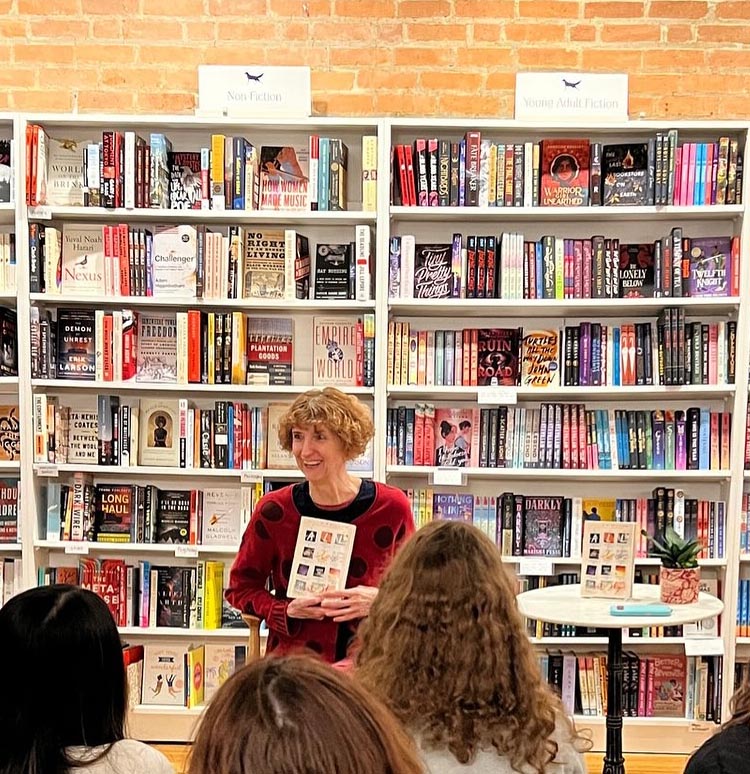
Kip Wilson at the launch of All the Love Under the Vast Sky at Molly's Bookstore last month
Photo From Molly's Bookstore
Last month, Melrose-based author Kip Wilson launched her latest book: All the Love Under the Vast Sky, an anthology of short-stories-in-verse for a young adult audience. Wilson served as the editor for the anthology and also contributed her own story, “The Bridegroom’s Oak.”
Wilson has also written three novels-in-verse for young adult audiences, all centered on the interwar period and the rise of Nazi Germany: White Rose, about Sophie Scholl, the student who was executed by Nazi authorities for her political activism; The Most Dazzling Girl in Berlin, which Wilson calls “Cabaret for teens,” about the end of the Weimar Republic in Germany; and One Last Shot, about photojournalist Gerda Taro, who was killed in action in the Spanish Civil War.
Wilson explained that she has always been fascinated by German language and culture: “I remember, as a first grader, my parents had vinyls of learning German, and I would put them on. I loved the sound of it - it can be a really beautiful language.”
When she began taking German classes in high school, Wilson learned about The White Rose: a group of students, including Scholl, who led a leaflet and graffiti campaign in opposition to the Nazi regime in 1942-43 before they were arrested and executed. “And twenty years later,” Wilson said, “I finally got to write their story” in her 2019 novel, White Rose. “That was my biggest dream, to help carry on their legacy.”
Wilson pursued a PhD in German literature, then went on to work on building German language models for voice recognition software. “I was actually using my degree,” she quipped, “which is very rare.” Later on, she pursued a path as a high school librarian, which is still her job today.
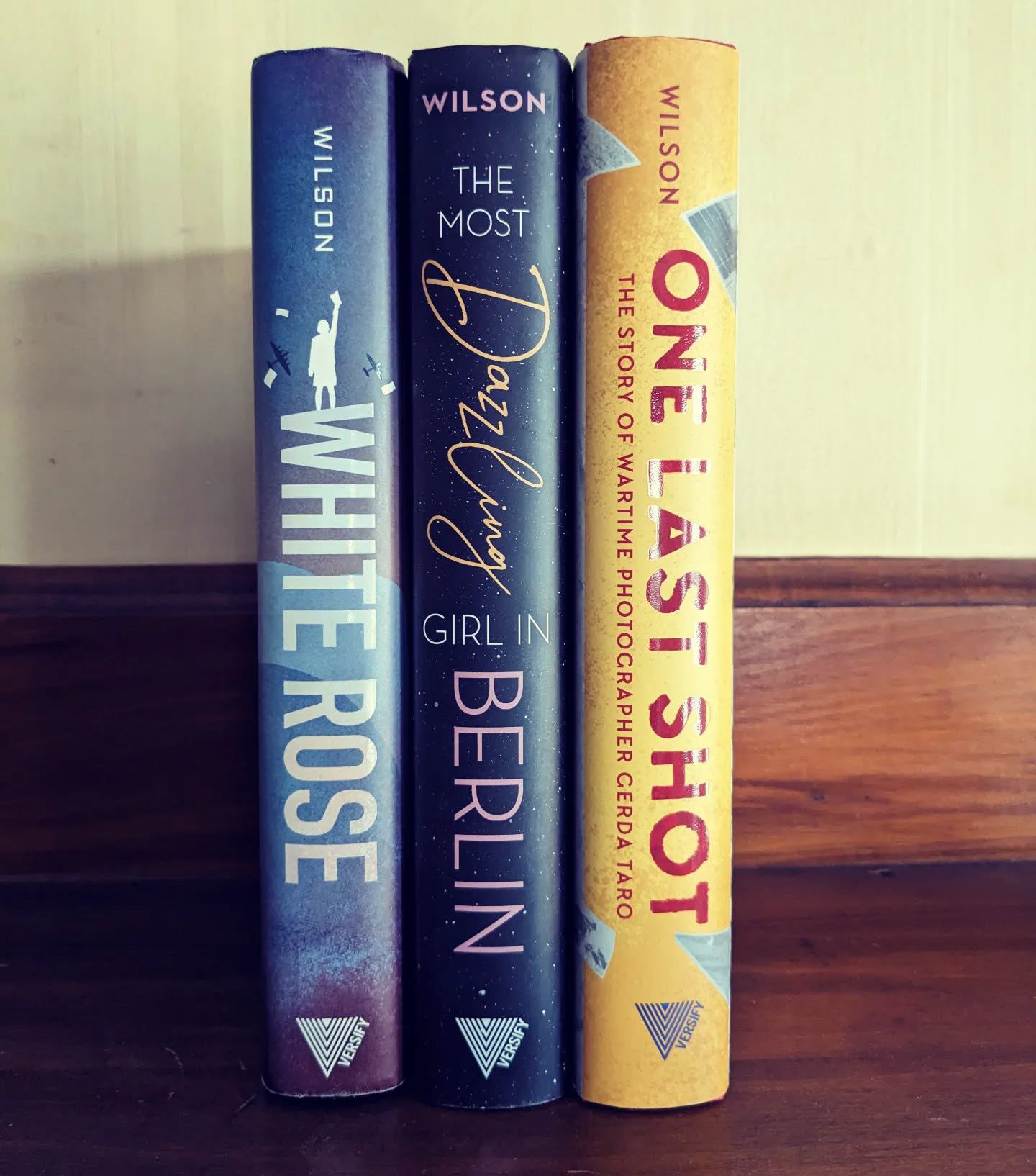
Wilson's three novels
Photo Credit: Kip Wilson
Wilson’s path into writing and publishing was not quick or easy. She sent off her first novel to publishers in 2003 “and I found out it was terrible.” But instead of giving up, Wilson used the experience as motivation to connect with other writers who could give her feedback and support her in honing her craft.
“I knew I wanted to write either middle grade or young adult novels,” said Wilson, “so I started going to conferences and workshops” through the Society of Children’s Book Writers and Illustrators. “In children’s literature, it’s very supportive. You all want each other to get better. Kidlit creators are some of the nicest people, you know, since they write for children.”
Wilson became the poetry editor for The Yarn magazine, and it was through this position that she was first inspired to try writing in verse. “I had interviewed two verse novelists for the publication,” Wilson explained: Leza Lowitz, who wrote Up From the Sea about the 2011 tsunami in Japan, and Dana Walrath, whose Like Water on Stone is about the Armenian Genocide. “I said I was having trouble with my White Rose story, and they said, ‘why don’t you try writing it in verse?’”
“So that next day, I started writing White Rose in verse,” Wilson went on. “And after struggling for so many years with how to tell it, then it was easy. This is how you do it.”
“Verse novels lend themselves well to dramatic and historic subjects,” explained Wilson, “because they have all that white space to soften the blow.” Karen Hesse’s Out of the Dust, about the Dust Bowl, won the Newbery Medal in 1998 and was one of the first novels-in-verse to become prominent in children’s literature. “Since then,” she said, “so many have won awards, and they’re generally pretty well regarded. They’re very much like graphic novels - kids like that they can get through them quickly. They’re not something you have to struggle through for weeks and weeks - you can get through one in an afternoon.”
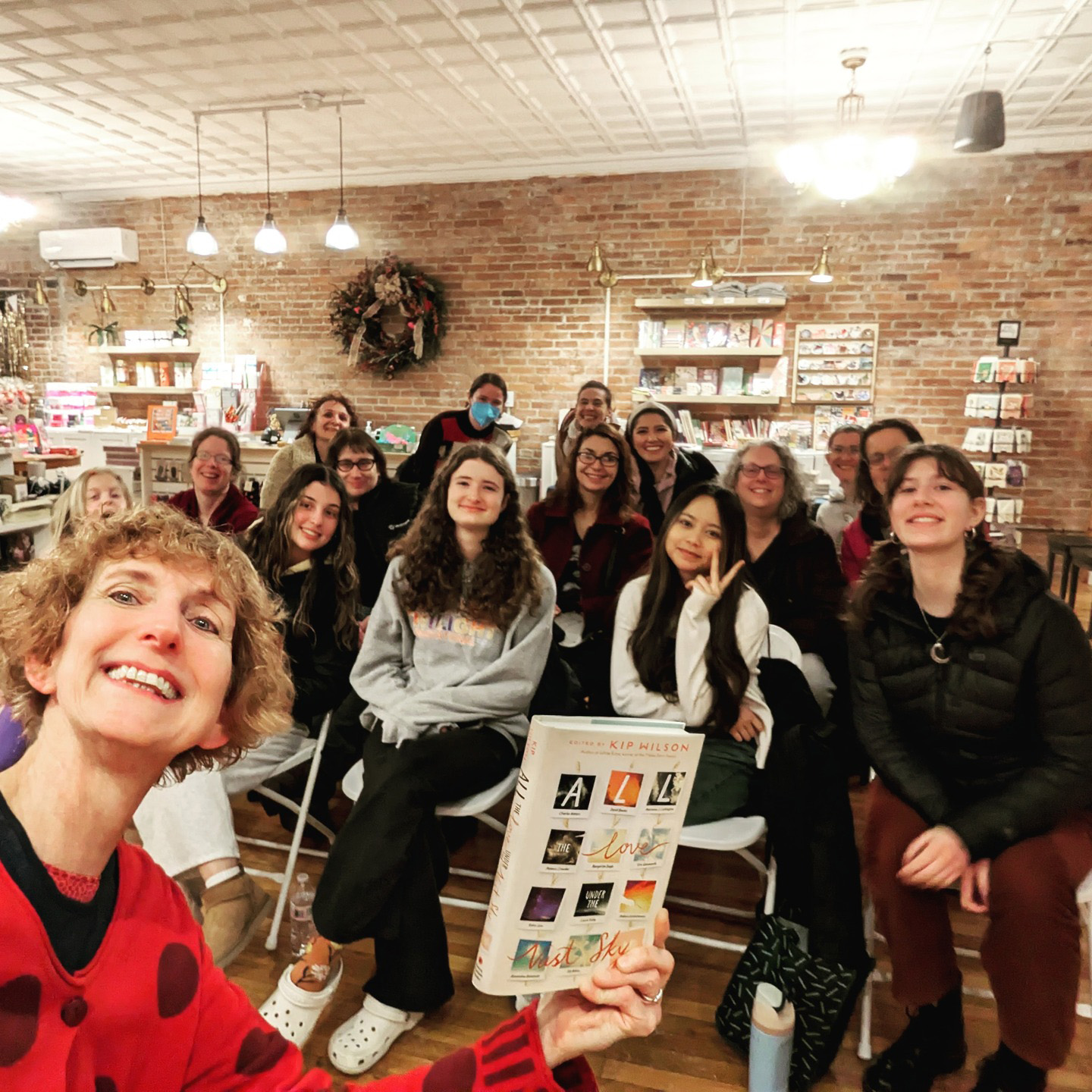
Wilson, left, at last month's book launch
Photo Credit: Kip Wilson
While Wilson’s novels are fictionalized, they are all meticulously researched. “I spend as much time researching as I do writing,” said Wilson. “It’s probably 50-50. Even with The Most Dazzling Girl in Berlin, which is about fictional characters, I did a ton of research because it’s a real world. I had the freedom to make the characters' lives whatever I wanted, but there were still constraints.” For White Rose and One Last Shot, which are both fictionalized biographies, Wilson felt even more pressure to ensure that her works are as historically accurate as possible.
“I used to have nightmares,” she said, “I would wake up in the middle of the night, worried: what if I got something wrong? Especially with White Rose, there is a lot of conflicting information between some of the sources, so I had to make some decisions based on what was most likely. I’m under the fictional umbrella, but trying to make it as factual as possible is very important to me.”
For Wilson, the fact that her novels are aimed at young adults is not an excuse to be sloppy with her research: each book has an extensive bibliography of primary and secondary sources. “I’m doing everything I possibly can,” she explained, “asking experts, looking for more sources to verify things.”
“My first drafts,” she went on, “are always just the facts and telling the story. They’re not that poetic; they’re lacking in motion.” It’s only after Wilson has set out a fact-based account that she adds fictionalized details, like what the characters are thinking and feeling.
Wilson’s focus on World War II comes from her own reading: “The first book I really had an emotional reaction to was The Diary of Anne Frank, which I read when I was eight,” said Wilson. “It destroyed me, as I’m sure it does most people who read it, and I wanted to know more.”
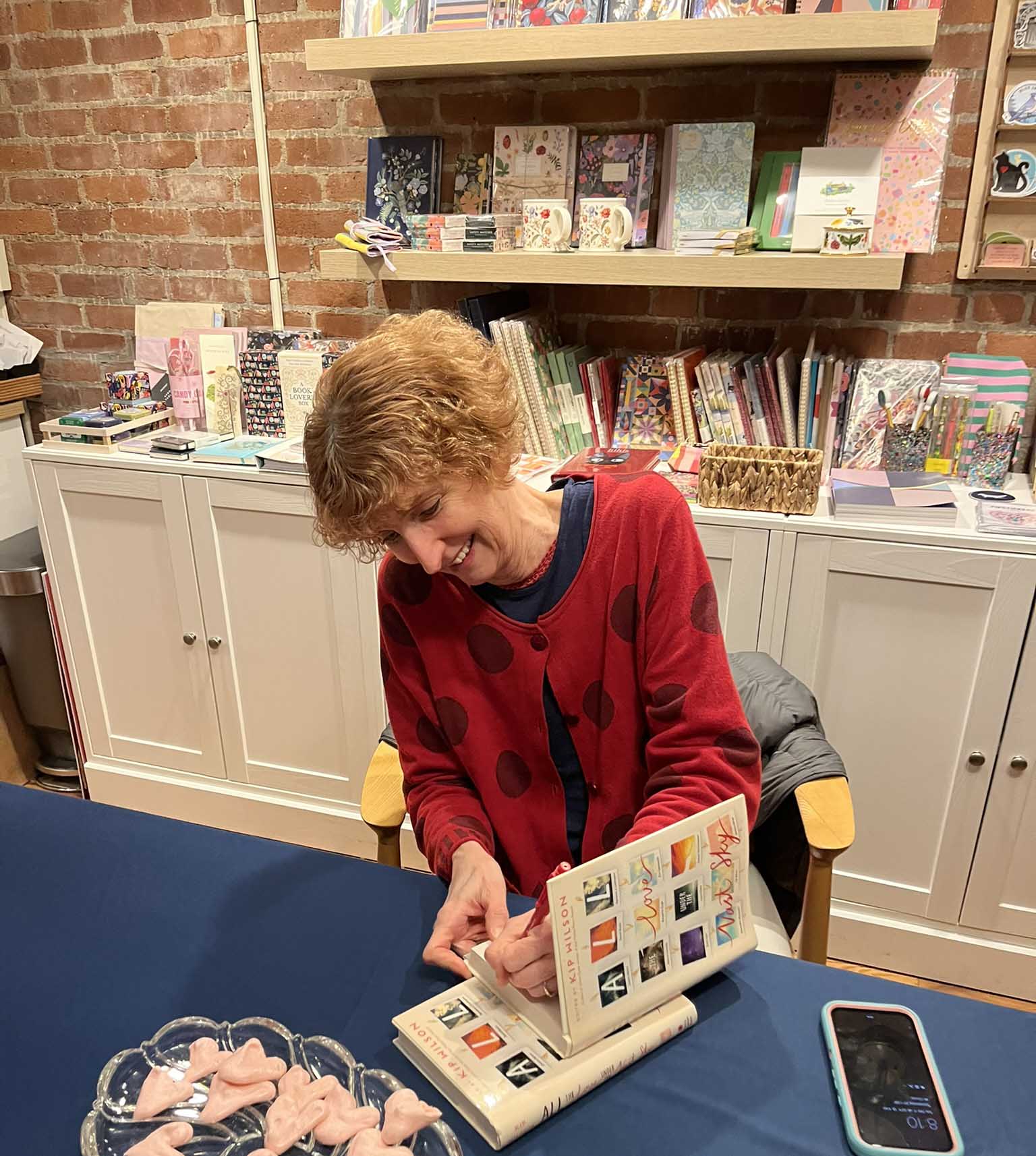
Wilson at last month's book launch
Photo Credit: Elizabeth Christopher
When Wilson wrote the first draft of White Rose in 2013, she said, “I wasn’t trying to capture anything that was going on. It was just that the whole ‘never again’ of the Holocaust still felt very immediate to me. I felt that democracy is very fragile. I wasn’t making parallels at that point, but rather, I was hoping there wouldn't be parallels.”
Now, with the rise of neo-Nazi and white supremacist ideas and imagery in the United States and around the world, Wilson’s books feel more relevant than ever - but her focus remains strictly on historical events.
“I have the luxury of writing about history,” she explained, “I don’t have to hit anyone over the head with it, because this is what happened. Historians are the most worried about what is going on now because we have seen this before.”
“Kid readers are smart,” she added, “and they can make the connections. They don’t need anyone to tell them. In the classroom, you can turn it over to the kids and let them have the discussions - you don’t have to do anything but present the material.”
Not all of Wilson’s writing is about such serious subject matter: her short story for the new anthology, All the Love Under the Vast Sky, is about love and friendship in 1899 Germany, without the specter of war on the immediate horizon.
At the book’s launch at Molly’s Bookstore last month, Wilson talked about the process of putting together the anthology, which features 12 young adult authors who write in verse, including Wilson herself.
When Wilson came up with the idea of the anthology, she reached out to other authors she knew, although she did cold-email a few of the contributors. Wilson came up with the theme of love - “there are lots of kinds of love,” she explained, “romantic love, or you can love your grandma or your cat” - and the authors interpreted the theme in their own ways.
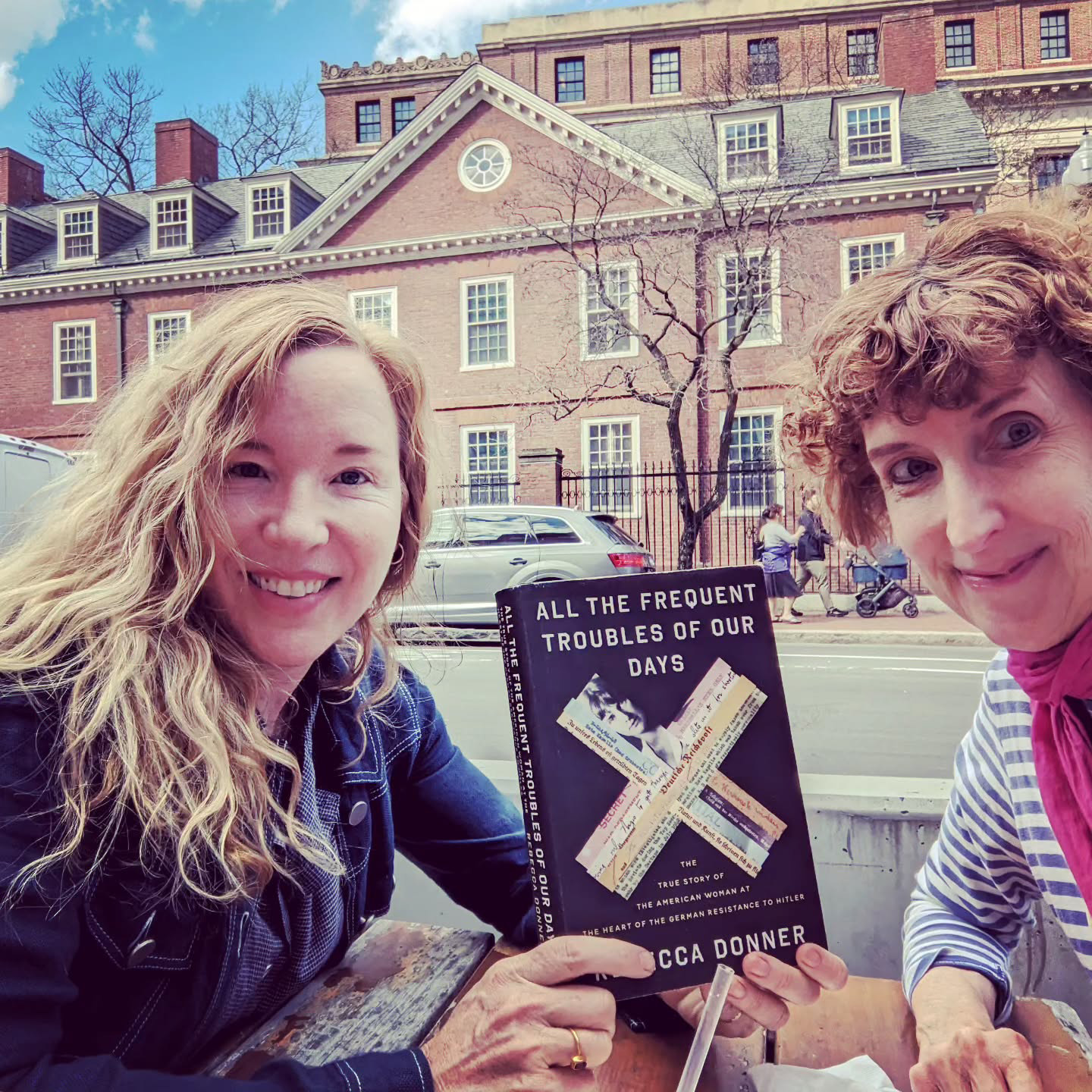
Wilson, right, with Rebecca Donner
Photo Credit: Kip Wilson
“When the stories started coming in,” said Wilson, “that was the absolute best. They’re all so beautiful in such different ways. Some are historical, others are contemporary or realistic,” and one even features a romance between a mermaid and a spirit.
The narrators are all teenagers, ranging in age from 13 to 18, providing “a good range of experiences,” said Wilson. The authors represent and write about characters with a range of identities, including African American, Native American, Latino/a, and LGBTQ+. And the historical stories feature twelfth century India, fifteenth century Mesoamerica, and a traveling circus in turn-of-the-century America.
Wilson’s next book, which is coming out in 2026, will be for middle grade readers. “It’s my first book for younger kids,” she said, “and my first book with a boy as the main character. It would have been great if he had been a girl,” Wilson joked, “but it’s OK, I got over it.”
The book will be based on the life of Donald Heath, Jr, whose father was a diplomat in Berlin in 1938-41. Heath worked as a courier for American spy and resistance member Mildred Harnack, who was the only American woman to be executed by the Nazis.
“I read a fantastic biography of Harnack,” Wilson explained, “written by Rebecca Donner, who is her great-great-niece, so she had access to all these documents. The book had these snippets titled, “The Boy,” and as I read them, I thought, ‘I want to read The Boy’s story!’ He’s since passed away, so I didn’t get to meet him, but Donner did, and she shared some of her research with me.”
Even after having had four of her books published, Wilson reflected, “I still don’t consider myself a poet-poet. I call myself a person who writes in verse. It’s less intimidating.”
Kip Wilson’s books, including her new anthology, All the Love Under the Vast Sky, can be found at Molly’s Bookstore.

Follow Us: